I want to perform some mathematical operations such as addition/subtraction, mean etc. on the data read from the file. The data is two dimensional, looks something like this:
 So now for example I want to subtract first row from the 3rd or 4th, it is very simple in python using indexing, but I have no idea how to do in c++.
Here is the code I'm using.
So now for example I want to subtract first row from the 3rd or 4th, it is very simple in python using indexing, but I have no idea how to do in c++.
Here is the code I'm using.
#include <boost/multi_array.hpp>
#include <boost/timer/timer.hpp>
#include <boost/range/irange.hpp>
#include <h5xx/h5xx.hpp>
#include <iostream>
#include <vector>
#include <algorithm>
#include <iterator>
#include <string>
using array_2d_t = boost::multi_array<float, 2>;
template <typename T>
void print_array(T const& array)
{
for (auto const& row : array)
{ for (auto v : row)
printf("%10f ", v);
printf("\n"); //prints a new line similar t0 \n
}
std::cout << "\n End of file" << std::endl;
}
array_2d_t read_frame(std::string const& filename, unsigned frame_no) {
//h5xx::file xaa("../../data/xaa.h5", h5xx::file::mode::in);
h5xx::file xaa(filename, h5xx::file::mode::in);
h5xx::group g(xaa, "particles/lipids/box/positions");
h5xx::dataset ds(g, "value");
// determine dataset shape: frames, particle count, space dimension
auto ds_shape = h5xx::dataspace(ds).extents<3>();
array_2d_t arr(boost::extents[ds_shape[1]][ds_shape[2]]);
std::vector<hsize_t> offsets{frame_no, 0, 0};
std::vector<hsize_t> counts{1, arr.shape()[0], arr.shape()[1]};
//std::vector<hsize_t> strid{1, arr.shape()[0], arr.shape()[1]};
// slice ohne stride:
h5xx::slice slice(offsets, counts);
h5xx::read_dataset(ds, arr, slice);
return arr;
}
int main(int argc, char const* argv[])
{
if (argc < 2) {
std::cout << "Usage: " << argv[0] << " input.h5" << std::endl;
return -1;
}
std::string filename(argv[1]);
print_array(read_frame(filename, 1));
return 0;
}
read_frame function takes the argument filename and frame_no. The file is divided into frames each containing (11214) rows, but it is not important to know here. So read_frame returns the two dimensional data for every frame. In the main() function I can print the data for every frame, but now suppose I want to subtract the first frame from the second, how can I do that? Does anyone know ho